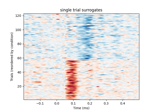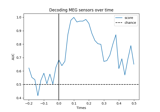mne.decoding.EMS#
- class mne.decoding.EMS[source]#
Transformer to compute event-matched spatial filters.
This version of EMS [1] operates on the entire time course. No time window needs to be specified. The result is a spatial filter at each time point and a corresponding time course. Intuitively, the result gives the similarity between the filter at each time point and the data vector (sensors) at that time point.
Note
EMS only works for binary classification.
- Attributes:
Methods
fit(X, y)Fit the spatial filters.
fit_transform(X[, y])Fit to data, then transform it.
Get metadata routing of this object.
get_params([deep])Get parameters for this estimator.
set_output(*[, transform])Set output container.
set_params(**params)Set the parameters of this estimator.
transform(X)Transform the data by the spatial filters.
References
- fit(X, y)[source]#
Fit the spatial filters.
- Parameters:
- Returns:
- selfinstance of
EMS Returns self.
- selfinstance of
Examples using
fit:
- fit_transform(X, y=None, **fit_params)[source]#
Fit to data, then transform it.
Fits transformer to X and y with optional parameters fit_params and returns a transformed version of X.
- Parameters:
- Xarray_like of shape (n_samples, n_features)
Input samples.
- yarray_like of shape (n_samples,) or (n_samples, n_outputs), default=None
Target values (None for unsupervised transformations).
- **fit_params
dict Additional fit parameters. Pass only if the estimator accepts additional params in its
fitmethod.
- Returns:
- get_metadata_routing()[source]#
Get metadata routing of this object.
Please check User Guide on how the routing mechanism works.
- Returns:
- routing
MetadataRequest A
MetadataRequestencapsulating routing information.
- routing
- set_output(*, transform=None)[source]#
Set output container.
See Introducing the set_output API for an example on how to use the API.
- Parameters:
- transform{“default”, “pandas”, “polars”}, default=None
Configure output of
transformandfit_transform.“default”: Default output format of a transformer
“pandas”: DataFrame output
“polars”: Polars output
None: Transform configuration is unchanged
New in v1.4: “polars” option was added.
- Returns:
- self
estimatorinstance Estimator instance.
- self

